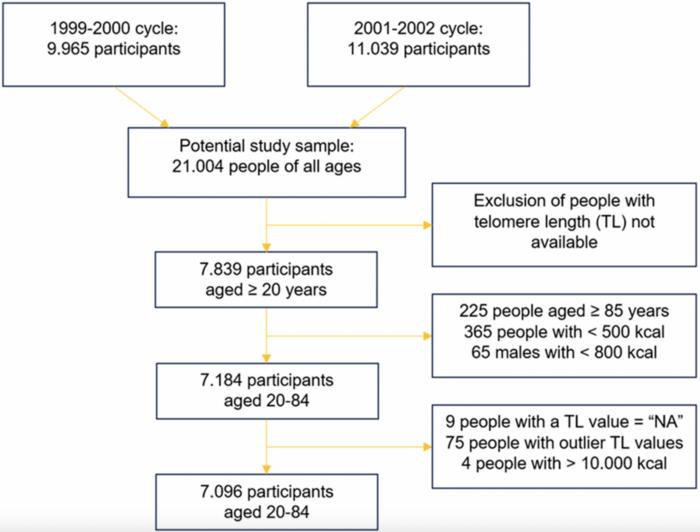A recent study published in the journal Aging has sparked significant interest among researchers and health professionals alike, focusing on the intricate relationship between diet, lifestyle, and telomere length. Conducted by a team from Wageningen University and Research in the Netherlands, this research utilized data from the National Health and Nutrition Examination Survey (NHANES) to undertake a comprehensive analysis of how various lifestyle factors influence telomere length, a crucial biomarker for cellular aging.
Telomeres, the protective caps located at the ends of chromosomes, play an essential role in maintaining chromosomal integrity. Over time, as cells divide, these telomeres progressively shorten, which can lead to impaired cell division and the onset of age-related diseases. Previous studies have correlated healthy lifestyle choices with preserved telomere length, but many have focused on a limited array of factors while neglecting key components such as chronic inflammation. The present study endeavors to fill this gap by employing advanced statistical modeling techniques known as Copula Graphical Models.
The research team analyzed health data from over 7,000 U.S. adults aged 20 to 84, collected during appropriate time frames between 1999 and 2002. This multi-faceted approach allowed the researchers to assess more than 100 variables impacting telomere length, including dietary habits, physical activity, smoking, and various blood biomarkers. The participants were divided into three age categories—young (20–39 years), middle-aged (40–59 years), and older adults (60–84 years)—to evaluate how age influences the relationships between these factors and telomere length.
One pivotal finding of the study indicates that the levels of C-reactive protein (CRP) are more prominently associated with telomere length than other lifestyle factors such as diet and physical activity. CRP serves as a widely recognized marker of inflammation, and its elevated levels were consistently linked with shorter telomeres, particularly in the younger and middle-aged groups. This correlation underscores a critical insight: chronic inflammation may be a more influential determinant of cellular aging than previously assumed lifestyle choices.
Furthermore, while lifestyle factors remain integral to overall health, this research asserts that their impact is likely mediated through their effects on inflammation rather than direct associations with telomere length. The authors propose that focusing on reducing chronic inflammation could be a more effective strategy for preserving telomere integrity and promoting healthier aging than conventional approaches that center primarily on dietary changes.
As the study further elucidates the relationship between lifestyle factors, telomeres, and aging, it calls into question previous research that isolated individual lifestyle elements for examination. By adopting a holistic data-driven methodology, this investigation provides a clearer picture of how various health behaviors and biological markers interact to influence the aging process at the cellular level.
While the results do not definitively establish cause-and-effect relationships, they strongly support the premise that inflammation plays a pivotal role in cellular aging. The authors advocate for additional long-term studies aimed at understanding the temporal dynamics between inflammation and telomere length. This pursuit is essential to elucidate the mechanisms by which chronic inflammation contributes to telomere attrition and age-associated diseases.
The implications of these findings extend beyond academic interest; they bear significant relevance for public health. As understanding chronic inflammation’s impact on aging becomes increasingly recognized, it highlights the importance of reducing inflammatory states through lifestyle interventions such as regular physical activity, stress management, and potential dietary modifications focused on anti-inflammatory foods.
In conclusion, the study not only challenges the traditional views on the relationship between diet and telomere length but also emphasizes the necessity of addressing chronic inflammation as a cornerstone of healthy aging. By shifting the focus of research and health recommendations to encompass inflammatory factors, there is potential for developing innovative approaches to enhance healthspan and mitigate age-related diseases.
The intricate interplay of biochemistry and lifestyle thus becomes not merely an academic curiosity but rather a critical consideration for individuals seeking longevity and healthy aging. With further research on this topic, the hope is that we can cultivate a deeper comprehension of cellular aging processes, ultimately guiding effective public health strategies for the aging population.
With its quantitative assessments and comprehensive methodologies, this study stands as a significant contribution to our understanding of aging and invites ongoing dialogue among researchers, clinicians, and the general public. Indeed, as we enter an era where the science of aging is becoming increasingly significant, studies like this will illuminate pathways to healthier futures.
Subject of Research: People
Article Title: Diet, lifestyle and telomere length: using Copula Graphical Models on NHANES data
News Publication Date: 29-Jan-2025
Web References: Aging-US
References: DOI: 10.18632/aging.206194
Image Credits: Copyright: © 2025 Tedaldi et al.
Keywords: aging, telomere length, NHANES, C-reactive protein, inflammation, lifestyle factors
Tags: aging and chronic disease correlationbiomarkers for cellular agingchronic inflammation and agingcomprehensive health data analysisCopula Graphical Models in researchdiet and telomere lengthfactors influencing telomere lengthhealthy lifestyle choices and aginglifestyle factors affecting telomeresNHANES data analysistelomere shortening implicationsWageningen University telomere study





